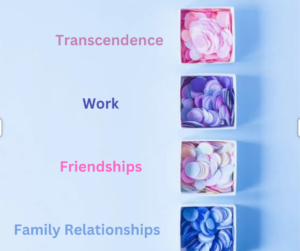
Victor Frankl, an Austrian psychiatrist who endured the horrors of World War II concentration camps and immense personal loss, once said, “Everything can be taken from a man but one thing: the last of the human freedoms—to choose one’s attitude in any given set of circumstances, to choose one’s own way.”
Is it truly possible to shape our perspective, even in the face of dire adversity? This question lies at the core of the latest book, “Build the Life You Want,” co-authored by social science writer Arthur Brooks and media icon Oprah Winfrey. While their own experiences may not match Frankl’s ordeal, they draw from exemplars like him and decades of research to distill lessons on nurturing happiness in life, regardless of our circumstances.
Many of us imagine that a happy life is one devoid of suffering, a continuous stream of joy. Yet, the authors assert that no one is exempt from sorrow or pain, emphasizing that we should not demand changes in our circumstances, such as landing the perfect job or finding a romantic partner, as prerequisites for happiness. They argue that unwavering happiness is an illusion but emphasize that we can take gradual steps that lead us toward a more enjoyable life.
“Happiness is not a destination. Happiness is a direction,” they affirm. “We won’t discover complete happiness on this side of heaven, but no matter where each of us is in life, we can all find ways to be happier.“

The Essential Ingredients for a Happier Life
Rather than striving for unwavering joy, the authors propose pursuing the following elements to enhance happiness:
- Enjoyment: This doesn’t mean solely seeking pleasure (like indulging in a delicious meal) but deriving pleasure from meaningful activities shared with others (e.g., partaking in a holiday meal with loved ones while expressing gratitude). Relationships and the significance we attach to experiences amplify life’s enjoyment.
- Satisfaction: Satisfaction should not be solely dependent on accomplishments but should arise from a sense of achievement rooted in our efforts. Achieving without effort, such as effortlessly acing a class, ultimately lacks fulfillment and enduring happiness.
- Purpose: A feeling of purpose is derived from our values and our capacity to contribute to the greater good. The authors stress that purpose is vital for maintaining satisfaction with life.
The authors emphasize a crucial point: some things that bring genuine happiness may be challenging, require effort, or even seem mundane, like caring for an ailing child. Moreover, negative emotions can serve a purpose, prompting us to seek support from others when we’re sad or encouraging us to adjust our behavior after experiencing regret. Waiting for negative feelings to vanish before pursuing happiness is counterproductive, they argue.
“If you believe you must eliminate your unhappiness before embarking on a quest for happiness, you’ll be unnecessarily hindered by the normal negative emotions of everyday life,” they state. “Unadulterated happiness is unattainable… and chasing it can be detrimental to our success.“
This doesn’t mean we shouldn’t strive to improve our life situations or that challenging circumstances are irrelevant to happiness. Numerous external factors affecting our happiness are largely beyond our control, from racism to inequality. Nevertheless, understanding how our mindsets influence our well-being can help us find happiness even when circumstances are unfavorable.
Managing Negative Emotions
Negative emotions undoubtedly hinder happiness, but the authors advocate for learning to handle them better, whether independently or with professional assistance, particularly if facing mental health issues like depression.
- Meta-cognition: Instead of merely experiencing emotions, we should engage in meta-cognition by slowing down and contemplating our feelings before reacting. This might involve counting to 30 when angry or assessing options before responding to a frustrating situation.
- Focusing on the positive amid negative feelings: Practicing gratitude for supportive friends during times of grief and learning from negative emotions are effective strategies. Recognizing that negative feelings can aid personal growth is important.
- Reducing self-focus: Lessening preoccupation with self-image and social comparisons, as seen in social media, can contribute to happiness. Redirecting attention to the well-being of others and extending kindness can lead to increased happiness.

The Four Key Realms of Happiness in Life
Amidst life’s distractions, the authors assert that the main keys to happiness revolve around relationships and meaning. They argue that our lives are interconnected with others, the world, nature, and the divine, and enhancing these connections can greatly improve our well-being. Here’s how they recommend augmenting happiness within the four main areas of life:
- Family Relationships: Address conflicts, which often arise from unspoken expectations, through open communication, letting go of perfectionism, and treating family members with respect and appreciation.
- Friendships: Deepen friendships by expressing affection, being vulnerable, and offering support when needed. Face-to-face interactions are crucial for well-being, and humility can foster stronger friendships.
- Work: Find meaning in your job, regardless of its nature. Engaging in work wholeheartedly, rather than using it as a distraction from negative emotions, can bring satisfaction and a sense of accomplishment.
- Transcendence: Seek moments of transcendence through experiences of awe, meditation, or connecting with something greater than yourself. These moments can provide a sense of purpose and protect against depression.
Ultimately, the authors stress that love is at the heart of the greatest happiness in each of these realms. Despite life’s challenges, returning to a place of love for family, friends, work, and the world can lead us in the right direction.